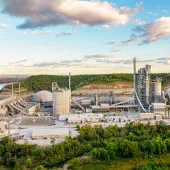HeidelbergCement pioneering CCUS in Bulgaria

Company’s ANRAV carbon capture utilization and storage project selected by EU Innovation Fund
HEIDELBERGCEMENT’s newly launched ANRAV CCUS project has been selected for Grant Agreement Preparation by the EU Innovation Fund, meaning that the project’s implementation will be supported.
The EU Innovation Fund – one of the world’s largest funding programmes for the commercial demonstration of innovative low-carbon technologies – aims to bring industrial solutions to the market to decarbonize Europe and support its transition to climate neutrality.
ANRAV aims to be the first full-chain CCUS project in Eastern Europe. It will link carbon capture facilities at the Bulgarian cement plant of HeidelbergCement’s subsidiary Devnya Cement through a pipeline system with offshore permanent storage under the Black Sea.
‘As the EU Innovation Fund is known to focus on technologies that bring on significant emission reductions, we are particularly pleased to have been recognized with our ANRAV CCUS project,’ said Dr Dominik von Achten, chairman of the managing board of HeidelbergCement.
‘HeidelbergCement are rapidly progressing on a number of large-scale carbon-capture initiatives globally, covering a range of promising options for both utilization and storage. ANRAV now has the potential to pave the way for CCUS in Eastern Europe as well.’
‘Our vision in the ANRAV consortium is to realize an economically viable CCUS cluster for Bulgaria and the neighbouring regions,’ said Mihail Polendakov, HeidelbergCement’s managing director for Bulgaria, Greece, and Albania. ‘It is an integral part of our planning to open up opportunities for others as well.’
The project is being carried out jointly with oil and gas company Petroceltic. Subject to regulatory and permitting aspects, it could commence operation as early as 2028, with a capturing capacity of 800,000 tonnes of CO2 per annum.









